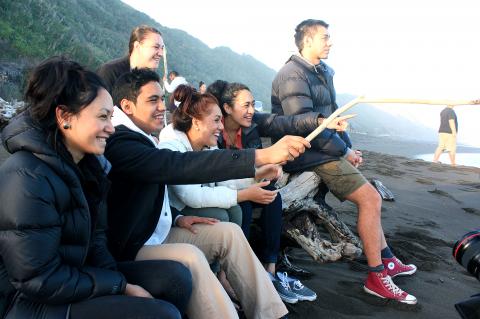In Maori mythology, their ancestors lived in a land called Hawaiki before migrating across the Pacific Ocean and settling in Aotearoa, the Maori word for New Zealand.
Hawaiki’s location — and even its existence — is the subject of debate, but some scholars speculate that “Hawaiki” may actually refer to Taiwan. Now a new film, currently in pre-production and seeking fundraising, will explore what this academic theory means for young Maori and Taiwanese Aboriginal people in search of their roots.
Developed by the ATAYAL Organization, a non-profit, the film will follow a group of Maori students as they meet people of indigenous descent in Taiwan. Scheduled to be completed next January, Beyond Hawaiki still needs to raise 75 percent of its NT$13,886,700 budget.

Photo courtesy of Tony Coolidge and Tobie Openshaw
“What I would like to do is allow these students to interact with indigenous students, share their language and culture and look for similarities,” says ATAYAL Organization founder Tony Coolidge (陳華友).
Coolidge also hopes the film will increase exposure for the ATAYAL Organization’s Tap Root Cultural Exchange Program, which will bring together people from indigenous communities throughout the Austronesian region.
Raised in the US, Coolidge did not learn about his Atayal roots until his Taiwanese mother died in 1994. Coolidge’s quest to reconnect with his maternal family’s Aboriginal heritage — and find out why it had been hidden from him — was the subject of the 2010 documentary Voices in the Clouds (眾族同聲).

Photo courtesy of Tony Coolidge and Tobie Openshaw
While learning about his background, Coolidge also became fascinated with Maori culture and began to brainstorm ways to facilitate connections between Austronesian tribal groups.
“Learning about Austronesian theory made [that goal] even more concrete and gave it an academic foundation,” says Coolidge. “It’s more than just bringing tribes around the world together. It’s also an opportunity to create a family reunion.”
Coolidge and filmmaker Tobie Openshaw met with Maori students and potential “Beyond Hawaiki” subjects from the Auckland University of Technology when they traveled to New Zealand in July to attend the Wairoa Maori Film Festival.
During their trip, Openshaw filmed interviews with several young Maoris.
“I asked them what does being Maori actually mean to you personally? How do you straddle traditional culture with having to make your way in the world of today?” Openshaw says.
Openshaw plans to incorporate footage shot by the students, who have learned how to combine Maori storytelling traditions with digital filmmaking techniques, into “Beyond Hawaiki.” Some of the young people he interviewed said they became closer to their families while reconnecting with their heritage, but others were met with opposition when they decided to study Maori culture.
“There is this one guy who looks white. His father is white and his mother is Maori, and he had to overcome a whole bunch of things,” says Openshaw. “He said his father asked him ‘Why do you want to go do that nigger stuff for?’ His family grew up white and it was at a great personal sacrifice that he decided to go on a four-year Maori course.”
Beyond Hawaiki’s NT$13,886,700 fundraising goal will cover travel, production, marketing and legal expenses. A complete breakdown of the project’s budget is available at www.atayal.org/beyond-hawaiki.php. There will also be volunteer opportunities for people who want to participate in the making and distribution of the documentary.
Coolidge hopes Beyond Hawaiki will help the Tap Root Cultural Exchange Program expand.
“We’ll start with the Maori coming to Taiwan and bringing Taiwanese to New Zealand, and we will expand to new countries every year,” he says. “If all goes well, we’ll have a movie with each country added.”
Coolidge adds: “So many people in Taiwan have an Austronesian background and they don’t know it. I’m hoping that by creating an exchange between people, kids can see more opportunities for the future.”
■ For more information about Beyond Hawaiki and the Tap Root Cultural Exchange Program, visit www.atayal.org

On April 26, The Lancet published a letter from two doctors at Taichung-based China Medical University Hospital (CMUH) warning that “Taiwan’s Health Care System is on the Brink of Collapse.” The authors said that “Years of policy inaction and mismanagement of resources have led to the National Health Insurance system operating under unsustainable conditions.” The pushback was immediate. Errors in the paper were quickly identified and publicized, to discredit the authors (the hospital apologized). CNA reported that CMUH said the letter described Taiwan in 2021 as having 62 nurses per 10,000 people, when the correct number was 78 nurses per 10,000

As we live longer, our risk of cognitive impairment is increasing. How can we delay the onset of symptoms? Do we have to give up every indulgence or can small changes make a difference? We asked neurologists for tips on how to keep our brains healthy for life. TAKE CARE OF YOUR HEALTH “All of the sensible things that apply to bodily health apply to brain health,” says Suzanne O’Sullivan, a consultant in neurology at the National Hospital for Neurology and Neurosurgery in London, and the author of The Age of Diagnosis. “When you’re 20, you can get away with absolute

May 5 to May 11 What started out as friction between Taiwanese students at Taichung First High School and a Japanese head cook escalated dramatically over the first two weeks of May 1927. It began on April 30 when the cook’s wife knew that lotus starch used in that night’s dinner had rat feces in it, but failed to inform staff until the meal was already prepared. The students believed that her silence was intentional, and filed a complaint. The school’s Japanese administrators sided with the cook’s family, dismissing the students as troublemakers and clamping down on their freedoms — with

As Donald Trump’s executive order in March led to the shuttering of Voice of America (VOA) — the global broadcaster whose roots date back to the fight against Nazi propaganda — he quickly attracted support from figures not used to aligning themselves with any US administration. Trump had ordered the US Agency for Global Media, the federal agency that funds VOA and other groups promoting independent journalism overseas, to be “eliminated to the maximum extent consistent with applicable law.” The decision suddenly halted programming in 49 languages to more than 425 million people. In Moscow, Margarita Simonyan, the hardline editor-in-chief of the